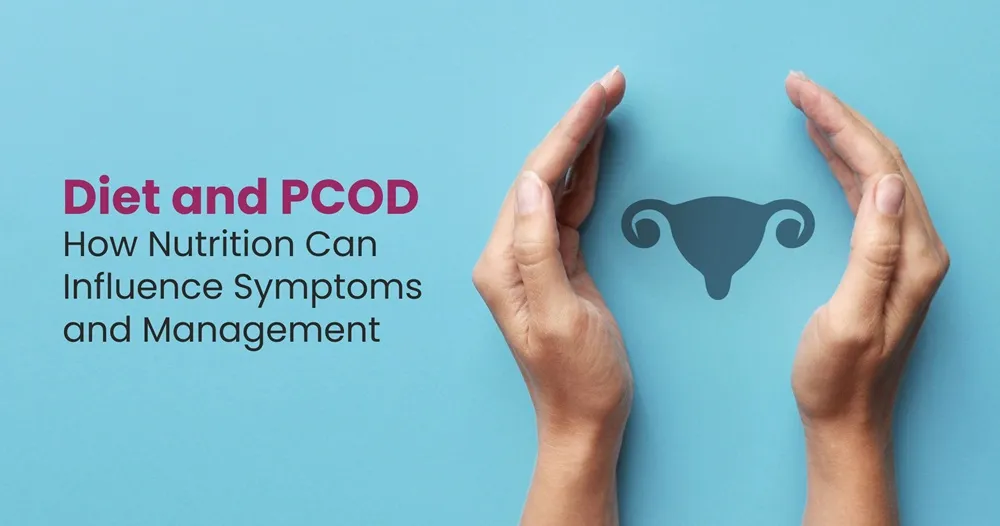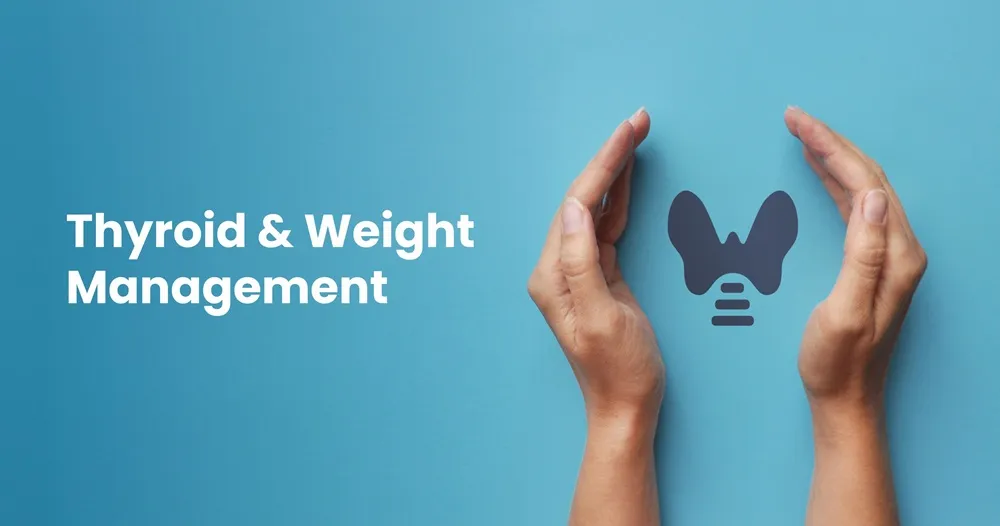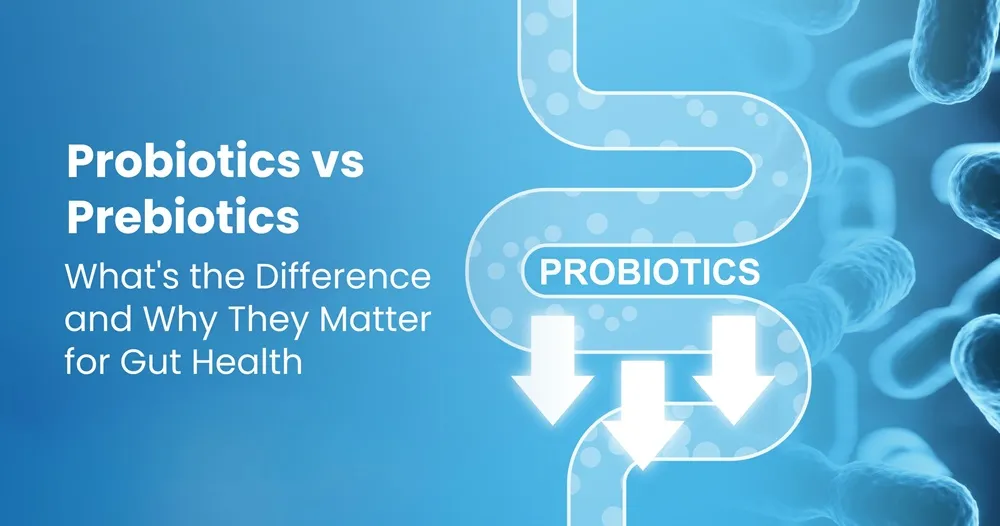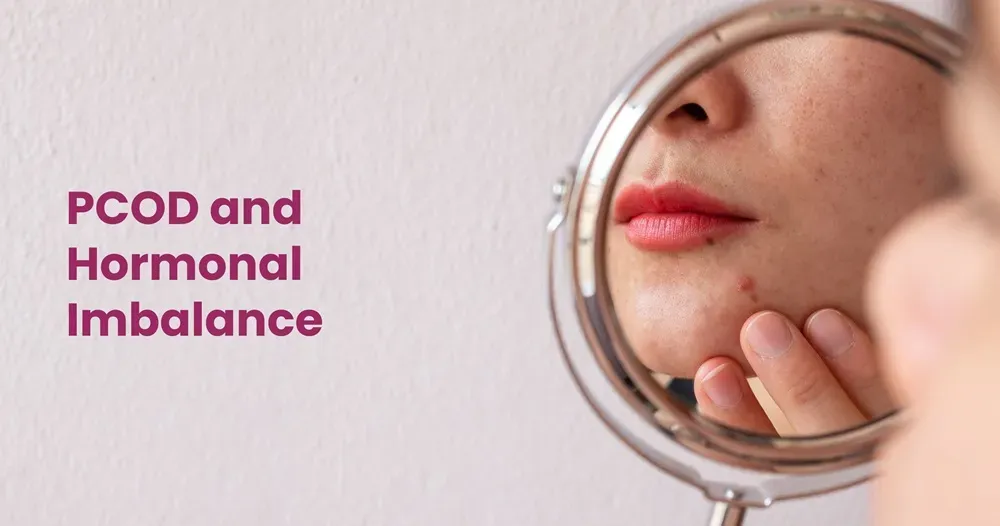Diet and PCOD: How Nutrition Can Influence Symptoms and Management
Mar 13, 2024

Polycystic Ovarian Disease (PCOD), also known as Polycystic Ovarian Syndrome (PCOS), is a common hormonal disorder affecting women of reproductive age. This PCOD eventually leads to Polycystic Ovarian Syndrome (PCOS). PCOS even goes undetected in around 70% of affected women globally.
To deal with this, many individuals with PCOS noticed that nutritional changes can effectively manage their symptoms. Thus, a great place to start with PCOD treatment is by making changes to your diet if you have been diagnosed with the condition or are experiencing symptoms.
In this article, learn about how nutrition helps in the management of PCOD with informed dietary changes.
What is Polycystic Ovarian Disease (PCOD)?
Polycystic ovarian disease (PCOD) causes the ovaries to release a large number of partially or underdeveloped eggs, which eventually develop into cysts. The common PCOD symptoms include,
- Irregular or nonexistent menstrual cycles
- Painful periods
- Excessive facial hair
- Acne
- Pelvic pain
- Problems in conceiving
- Patches of velvety, dark, dense skin
Future implications of PCOD may include
- Type 2 diabetes
- Severe obesity
- Obstructive sleep apnea
- Cardiac difficulties
- Psychological issues
- Endometrial cancer
How Does PCOD Occur?
Normally, the ovaries secrete only a small amount of androgens, or male sex hormones, along with female sex hormones. They support healthy egg formation in the ovaries throughout each menstrual cycle.
An imbalance of these sex hormones and increased androgens lead to polycystic ovarian syndrome. As a result, patients experience irregular periods, acne, and an increase in body and facial hair.
How does Diet Influence PCOD?
The four primary factors that contribute to PCOD or PCOS are as follows:
- Insulin resistance
- Modifications to metabolic and hormonal processes
- Elevated body fat levels
- Issues generating gonadotropin-releasing hormones, which are essential for reproductive health
One way to stop this pattern and lessen the effects of PCOD is through a PCOD diet. Additionally, it might lessen the chance of problems like diabetes and cancer. Dietary changes may be helpful to women with PCOS in the following ways by managing:
- Body weight
- Ability to produce and resist insulin
- Blood sugar levels
- Oxidative stress, which raises the risk of cancer and inflammation
Which Diet Helps Better Manage PCOS?
While there is not an appropriate diet for PCOD or PCOS, there are several strategies that seem to help those suffering from it. The following three diets may be helpful to assist women with PCOD to manage their symptoms:
- A low glycemic index (GI) diet
For a PCOD diet, low-glycemic index (GI) foods are recommended as they are digested slowly, preventing rapid spikes in insulin levels. These include whole grains, legumes, nuts, and most fruits and vegetables, as opposed to processed carbs and sugary foods, which have a high GI and can exacerbate insulin resistance.
- An Anti-inflammatory Diet
A PCOD diet high in anti-inflammatory foods may help improve PCOD or PCOS-related signs such as elevated blood sugar, body composition, hormonal imbalance, and cardiovascular risk. The foods that have anti-inflammatory properties are:
- The DASH Diet
The Dietary Approaches to Stop Hypertension (DASH) diet is frequently advised by doctors to lower the risk or severity of heart disease; however, it may also aid in managing PCODwith nutrition. A diet rich in DASH are:
- Fish,
- Poultry,
- Fruits,
- Vegetables,
- Whole grains,
- Low-fat dairy produce
A 2021 review found that a DASH diet may help with several PCOS symptoms. A couple of instances are the ovary's appearance and the reduction in the number of growths. Additionally, it may help with fat accumulation, glycemic regulation, and insulin resistance.
Foods to Include in PCOD-Friendly Diet
If you have been dealing with PCOD for a long time, consider incorporating food in your diet that helps manage PCOS causes. Food sources recommended to include in a PCOD-friendly diet include:
- Raw foods
- Foods high in fibre
- Fatty fish, including sardines, tuna, salmon, and mackerel
- Spinach, kale, and other leafy, dark greens
- Dark red fruits, such as cherries, blueberries, blackberries, and red grapes
- Broccoli, cauliflower, lentils, and other legume-based dried beans
- Spices like cinnamon and turmeric
- Nuts, such as pine nuts, walnuts, almonds, and pistachios; healthy fats, including olive oil and avocados.
Foods to Avoid during PCOD
Foods that raise the risk of PCOD can be avoided by those who have diabetes, heart disease, obesity, and other prevalent medical conditions. Foods suggested to avoid in the PCOD diet are:
- Refined carbohydrates, which are found in white bread and mass-produced pastries
- Fried foods, especially fast food
- Carbonated beverages, like soda and energy drinks
- Processed meats such as luncheon meats, hot dogs, and sausages
- Solid fats, such as lard, margarine, and shortening
- excessive intake of red meat, including pork, hamburgers, and steaks
- Food items with a lot of added sugar or salt, as well as other highly processed foods.
The Bottom Line
Following a carefully planned PCOD diet plan may greatly enhance PCOS symptom management. To design a customized PCOD diet plan for weight loss and hormone balance that suits your unique needs, speak with a medical practitioner or nutritionist. Recall that making modest, long-lasting dietary adjustments can have a big impact on your PCOS journey.
With Apollo Diagnostic, discover a healthier you. Our experienced nutritionists test your hormone levels and provide individualized nutrition plans to control weight, balance hormones, and improve fertility. Say goodbye to the PCOD symptoms and embrace overall well-being.
FAQs
Can diet help with PCOD symptoms?
Many women with PCOD discover that by simply altering their diet, their symptoms are controlled. This usually involves reducing refined carbohydrates and sugary foods while increasing the intake of foods high in fibre and lean protein.
What are the other lifestyle measures to manage PCOD?
People with PCOD can also better manage their illness by changing their lifestyle. Incorporating physical activity and nutritional changes may have the following advantages:
- Reduction in weight
- Enhanced metabolism of insulin
- More regular periods
- Decreased levels of male hormones and male pattern hair loss
- Decreased levels of cholesterol
Can somebody with PCOD consume milk?
Dairy is best avoided if you have PCOD, especially if your testosterone or androgen levels are high. This is due to the possibility that skim milk will raise testosterone and insulin levels, causing additional metabolic abnormalities.
How long does it take to see improvements in PCOS symptoms with dietary changes?
The timeline for seeing improvements in PCOS symptoms can vary from person to person. While some may notice positive changes within a few weeks or months, others may take longer to experience significant improvements. Consistency and patience are key when making dietary and lifestyle changes for PCOS management.
Related Blog Post
Blog Categories
- Child Health
- Mens Health
- Women's Health
- Mental Health
- Health Myths & Facts
- Fitness
- Nutrition/Recipes
- Remedies
- Weight Management
- Stress Management
- Health Supplements
- Addiction Management
- Disease Management
- Allergy
- Anemia
- Arthritis
- Asthma
- Autoimmune Diseases
- Blood Pressure
- Cancer
- Deficiencies
- Dengue/Malaria/Chikungunya
- Diabetes
- Eye Problems
- Heart Diseases
- Hepatitis
- HIV/AIDS/STD
- Hormonal Imbalance
- Infection/Flu/Viral
- Kidney
- Liver
- Menstrual Problems
- Pregnancy
- Skin & Hair Problems
- Stomach Ailments
- Thyroid
- Others
- Health Checkups
- Diagnostics/Pathology
- Lifestyle & Wellness
- Covid
- Medical Tests
- Cholesterol
- Health Tips
- Parent Care/Old Age
- Lungs
- Food Intolerance









